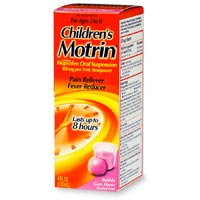Top Class Actions’s website and social media posts use affiliate links. If you make a purchase using such links, we may receive a commission, but it will not result in any additional charges to you. Please review our Affiliate Link Disclosure for more information.

Hunt alleges in the SJS lawsuit that her daughter suffered personal injury on Feb. 4, 2010, after ingesting Children’s Motrin — a nonprescription drug manufactured by McNeil Consumer Healthcare. The active ingredient in Children’s Motrin is ibuprofen. Hunt claims Children’s Motrin caused her daughter to contract Stevens Johnson Syndrome and/or Toxic Epidermal Necrolysis (SJS/TEN).
Stevens Johnson Syndrome (SJS) is an autoimmune disease. Autoimmune diseases or reactions are situations wherein the body attacks itself, using the immune system it usually uses to fight off infection. In SJS, the body attacks its own skin, causing a painful rash, which escalates to blisters, then sores, and finally ulcers. The damage can spread to the surface of the internal organs and the eyes. In some cases, it can even prove fatal. The reaction is almost always triggered by various medications, including ibuprofen.
Hunt filed Stevens Johnson Syndrome lawsuit under the Louisiana Products Liability Act (LPLA), alleging Children’s Motrin contains inadequate warnings of potential health problems.
The LPLA provides the exclusive remedy against manufacturers in a products liability action. The LPLA has four elements: (1) A plaintiff must prove “that the defendant is a manufacturer of the product; (2) that the [plaintiff’s] damage was proximately caused by a characteristic of the product; (3) that this characteristic made the product ‘unreasonably dangerous;’ and (4) that the [plaintiff’s] damage arose from a reasonably anticipated use of the product by the [plaintiff] or someone else.”
McNeil moved to dismiss the Children’s Motrin SJS lawsuit for failure to prove causation, and the motion was granted in part. They re‐urged the motions again at close of evidence, but the court denied and submitted the SJS lawsuit to jury trial. However, the jury was unable to reach a unanimous verdict, so the case was declared a mistrial. The judgment fell to Rule 50 of the Federal Rules of Civil Procedure.
Rule 50 allows the court to enter judgment as a matter of law when a party has been fully heard on an issue during a jury trial. “In order to survive a Rule 50 motion, the non‐moving party must establish a conflict of substantial evidence for each element of his or her claim.” According to the judge, Hunt failed to do so.
In her Stevens Johnson Syndrome lawsuit, Hunt explained that “she trusted Children’s Motrin, that she had been using it for years on her three minor children, and that none of her children had ever suffered an adverse reaction until [her daughter’s] injuries in 2010.”
In her order, Judge Milazzo of the U.S. District Court for the Eastern District of Louisiana said Hunt’s daughter “undoubtedly suffered horrific injury. Unfortunately, Plaintiff has failed to establish a conflict of substantial evidence for an essential element of her claim.” As a result, Milazzo entered judgment in favor of the Defendant.
The Stevens Johnson Syndrome lawsuit is Keisha Hunt v. McNeil Consumer Healthcare, Case No: 11-457 in the U.S. District Court for the Eastern District of Louisiana.
In general, SJS lawsuits are filed individually by each plaintiff and are not class actions.
Do YOU have a legal claim? Fill out the form on this page now for a free, immediate, and confidential case evaluation. The attorneys who work with Top Class Actions will contact you if you qualify to let you know if an individual lawsuit or class action lawsuit is best for you. Hurry — statutes of limitations may apply.
ATTORNEY ADVERTISING
Top Class Actions is a Proud Member of the American Bar Association
LEGAL INFORMATION IS NOT LEGAL ADVICE
Top Class Actions Legal Statement
©2008 – 2024 Top Class Actions® LLC
Various Trademarks held by their respective owners
This website is not intended for viewing or usage by European Union citizens.
Get Help – It’s Free
Help for Victims of Stevens Johnson Syndrome
If you or a loved one were diagnosed with Stevens Johnson Syndrome (SJS) or toxic epidermal necrolysis (TEN) after taking a prescribed or over-the-counter medication, you may be eligible to take legal action against the drug’s manufacturer. Filing an SJS lawsuit or class action lawsuit may help you obtain compensation for medical bills, pain and suffering, and other damages. Obtain a free and confidential review of your case by filling out the form below.
An attorney will contact you if you qualify to discuss the details of your potential case at no charge to you.
Oops! We could not locate your form.












